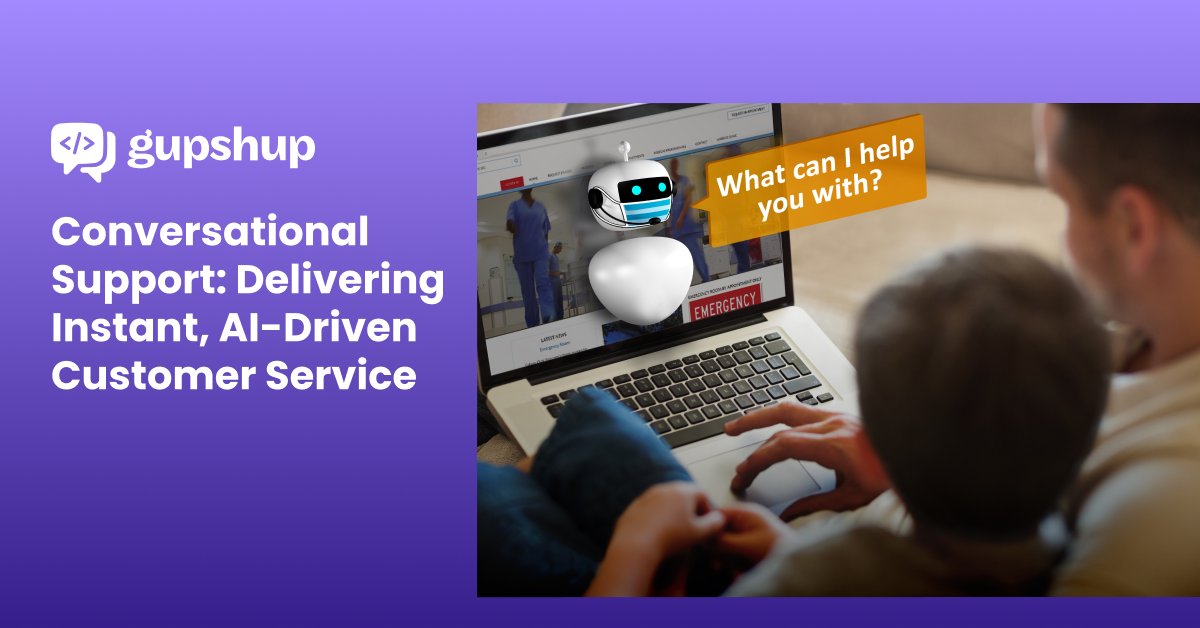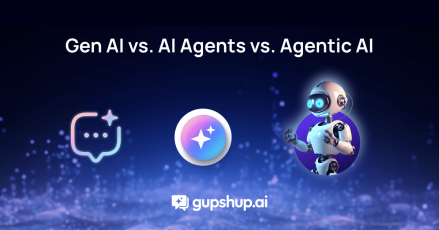Conversational Support: Delivering Instant, AI-Driven Customer Service

Are you still using email threads and ticket numbers for customer support?
Your customers have moved on, and they expect you to keep up. Talk about a delivery update, a product issue, or just a quick question about availability. People want answers right away, preferably through the same channels they use to talk to their peers. They want fast, simple, human conversations.
That is exactly what conversational support is built for. It does not have to replace your team, it is here to make every interaction smarter and faster with AI-powered messaging that works across your entire customer support ecosystem.
And the data is here to make things clearer –
- 90% of customers say an immediate response is essential.
- 55% of businesses using conversational support and marketing report higher-quality leads.
- By 2030, the market for AI Agents will reach approximately $826B, thus making conversational support even more powerful.
With expectations rising and attention spans shrinking, delivering real-time, personalized help will be the only way to remain competitive.
In this article, we will discuss conversational support and its effectiveness for businesses across industries. We will also learn how Gupshup’s Conversational AI is helping leading brands deliver seamless, scalable services without sacrificing the human touch.
TL;DR
Conversational support is an AI-driven customer service model that delivers fast, personalized help through platforms like WhatsApp and web chat. Unlike traditional support, it’s available 24/7, scales effortlessly, and feels human.
Powered by conversational AI, these services handle common queries instantly, understand context, and route complex issues smartly.
With tools like Gupshup, businesses can streamline support, reduce costs, and enhance customer satisfaction, making real-time, conversational support efficient and essential.
What Exactly Is Conversational Support—and Why Does It Matter Now?
Conversational support is like customer service that speaks your customer’s language (in real time without long waiting hours). This kind of support is available on platforms like WhatsApp, web chat, Instagram DMs, and more. No forms. No long email threads. Just simple, fast, helpful, human-like interactions from AI Agents that are always available.
Unlike traditional service models that rely on ticket numbers and long hold times, conversational support is primarily built for convenience. It is asynchronous, meaning consumers don’t have to stay glued to a screen; they can send a message and return when they want to. Not only that, but it is also personalized and proactive, with AI Agents that remember past interactions and tailor responses to individual needs.
This approach is way more efficient, scalable, and aligned with how people prefer to communicate. Here’s what sets conversational support services apart:
- Conversations can start on any channel and continue seamlessly.
- Simple queries are handled instantly by AI agents.
- Complex issues are routed to live agents, with full context retained.
- Every interaction feels like a natural dialogue, not a robotic script.
The shift from basic chatbots to intelligent AI Agents is key here. While early automation relied on rigid decision trees and templated replies, modern AI-driven systems use natural language processing (NLP) to understand nuance, intent, and emotion. That means customers get quicker, more relevant answers, without repeating themselves.
And customers are embracing it. A recent report by Salesforce found that 85% of customers expect consistent interactions across departments, and conversational tools make that possible by unifying touchpoints under one experience.
What Makes Conversational Support a Game-Changer for CX?
Good customer support keeps customers satisfied. Great support keeps them coming back. However, exceptional support is what builds real customer loyalty. It is one of the most effective ways to raise the bar. Here is why businesses are leaning more toward conversational support for a great customer experience –
1. Customers get help the moment they need it
“Your call is important to us. Please wait while we connect you to our customer support agent”. How often have you heard that and thought you would never buy from this business again? With AI Agents available 24/7 across multiple channels, customers now get the support they need instantly without having to wait.
Karan: Hi, I would like to check the status of my order.
AI Agent: Sure! Your order #987654 is out for delivery and should reach you today by 5 PM. Can I assist you with anything else?
2. Conversations feel tailored, not templated
Personalization is baked into modern conversational support services like AI Agents. These AI Agents understand the buyer and study customer behaviors and previous conversations to answer queries or make relevant product suggestions. This makes them almost as good as human agents. And because conversations are asynchronous, users can pick it up where they left off across multiple devices or platforms, and the AI Agent will remember.
3. Support scales without burning your team
Whether you are conversing with one customer or one thousand, AI Agents don’t stop. Just one conversational AI Agent can handle endless conversations at once without compromising quality. It is an absolute game-changer, especially during important events like flash sales, product drops, or seasonal spikes. Instead of adding pressure on your support team, you are adding capacity without any extra cost. In fact, Gartner predicts that tools like Conversational AI can reduce labor costs by $80 billion.
4. It’s fast, cost-efficient, and delivers real results
Conversational support cuts operational costs by automating the high-volume, low-value queries that consume team bandwidth. In return, you get:
- Shorter resolution times
- Higher agent productivity
- Lower ticket volumes
- Happier customers
And it doesn’t just impact your support team. Smooth, fast service drives higher CSAT scores, strengthens brand perception, and reduces customer churn. In fact, 75% of customers expect service within five minutes of contact, according to industry data. With conversational support, five minutes is generous.
Here’s How AI Makes It All Work Behind The Scenes
Behind every smart response is smarter tech. Conversational support feels simple on the surface, but it’s powered by a large stack of AI tools working silently in the background. From understanding what a customer really means to learning from every interaction, AI transforms support into something that’s reactive and intelligent.
Smarter AI agents that actually understand what people mean
Support conversations don’t always follow a script, and that’s exactly why AI agents need to think beyond keywords.
With natural language processing (NLP), these agents can pick up not just what customers are saying, but how they’re saying it. Whether someone asks “Where’s my order?”, “Did my food leave yet?”, or “Has it been dispatched?”, the AI knows they’re all versions of the same intent.
Even tone and urgency aren’t lost. If a user sounds frustrated or confused, the agent can adapt its tone or escalate the chat automatically.
Analytics that fuel better decisions and better conversations
Every interaction is data. And with conversational support services, that data becomes actionable.
AI tracks metrics like:
- Sentiment over time
- Drop-off points in a chat flow
- Average resolution time
- Which messages drive the most engagement
These insights aren’t just for show. They’re used to:
- Improve future AI agent responses
- Identify where humans should step in
- Optimize entire support flows in real-time
For example, if customers consistently drop off during a payment query, it might signal friction in that step. With AI, your team is alerted and can fix the issue before it affects CSAT.
Since these insights are in real time, businesses can act on feedback as it happens, not weeks later.
Where Does Conversational Support Really Shine?
Conversational support isn’t limited to one sector. Its real strength lies in its versatility. Across industries, it adapts to meet specific customer needs. Here’s how different sectors are making it work.
E-commerce
Even the most intuitive product page can’t answer everything. Customers often need that extra bit of clarity. It could be about sizing, delivery timelines, or return policies. Conversational AI makes it easy for them to ask and get instant answers without leaving the chat app they’re already on.
Karan: What size should I get in this jacket?
AI Agent: Based on your previous orders, a Medium should be a perfect fit. Would you like to check the return policy just in case?
E-commerce brands reduce friction and drive conversions by handling product queries, order tracking, and returns through conversational support while freeing up agents to handle more complex issues.
Banking
Consumers don’t want to call a helpline for basic banking needs. They want fast, secure, and personalized help without logging into a dozen apps.
Conversational AI agents are now handling everything from balance checks and due-date reminders to card reissuance.
Raj: When is my next EMI due?
AI Agent: Your EMI is due on April 5. Would you like me to set a reminder or help you pay now?
With conversational support services, banks simplify customer interactions while maintaining high security and compliance standards. The result is reduced call center load and improved user satisfaction.
Healthcare
In healthcare, timing and clarity are critical. Whether it’s rescheduling an appointment, checking symptoms, or requesting a prescription refill, conversational AI offers patients an accessible and dependable line of communication.
Customer: I need to change my appointment for tomorrow.
AI Agent: Sure, your current slot is 11 AM Tuesday. Would you prefer afternoon or a different day?
These conversations improve convenience, reduce pressure on hospital front desks, and help patients take more control of their care.
Education
Educational institutions are under constant pressure to manage information flow across students, parents, and prospective applicants. Conversational support solves this by offering real-time assistance for frequently asked questions, application tracking, and even academic support.
Arjun: What’s the deadline for assignment submission?
AI Agent: The final deadline is Friday, 5 PM. Would you like to set a reminder?
By using conversational AI to guide students and applicants through high-volume queries, schools can improve both operational efficiency and student experience without additional staffing.
Travel
Travelers need help before, during, and after their trip, and often, they need it fast. Conversational support offers a way to handle itinerary changes, check-ins, delays, or even quick tips about local attractions.
Vishal: My flight just got delayed.
AI Agent: Thanks for the update. Your new departure is 6:45 PM. Want to notify your hotel or look for lounge access?
When customers are on the move, convenience matters, and travel brands using conversational support respond faster and keep stress levels down by offering proactive updates and timely assistance.
Want to Do It Right? Here Are 4 Things to Keep in Mind
Implementing conversational support effectively requires a strategic approach that balances technology with human insight.
Here are four key considerations to ensure success:
1.Blend automation and human support for optimal customer experiences
While AI Agents can handle routine inquiries efficiently, complex issues often necessitate human intervention. Establishing clear escalation paths ensures that when an AI agent encounters a query beyond its scope, the conversation automatically transfers to a human agent.
2. Integrate systems to maintain context across all customer interactions
Customers expect consistent and personalized experiences regardless of the communication channel. Integrating customer data across platforms like email, chat, and social media creates a unified view of each customer. This integration enables support agents and AI systems to access historical interactions, ensuring that customers don’t have to repeat information and receive responses tailored to their previous engagements.
3. Train AI Agents using real conversations to enhance understanding
Developing AI Agents that comprehend and respond appropriately to customer inquiries requires training them on actual conversational data. By analyzing real interactions, AI systems can learn the nuances of customer language, intent, and common issues, leading to more accurate and helpful responses.
4. Use data to personalize, prioritize, and continuously improve support
Data analytics helps businesses understand customer behavior, preferences, and pain points. This information can be used to personalize interactions, prioritize urgent issues, and refine support strategies over time. Continuous monitoring and analysis of support interactions help identify improvement areas, ensuring that AI agents and human support staff evolve to meet changing customer needs.
Wrapping Up
Conversational support has become a necessity. Customers expect immediate, helpful responses across the platforms they already use. With AI, businesses can deliver this level of service at scale. AI Agents handle common queries 24/7, understand intent through natural language processing, and personalize interactions based on user behavior.
AI Agents have set a new standard as most consumers now prefer chat-based support over waiting for a human agent. The message is clear: Real-time, AI-driven conversations are expected.
Gupshup’s Conversational Support Platform helps leading brands deliver fast, intuitive, and personalized support across 30+ channels. Ready to move beyond reactive service?
Book a demo with Gupshup and see what conversational support can do for your business.
FAQ’s
1. What is conversational AI for customer support?
Conversational AI refers to technologies like chatbots and virtual agents that use natural language processing (NLP) and machine learning to automate and enhance customer interactions, providing real-time, personalized support across various communication channels.
2. How do AI-driven chatbots improve customer service and support?
AI-driven chatbots enhance customer service by offering 24/7 assistance, handling routine inquiries, reducing wait times, and freeing human agents to focus on complex issues, thereby improving efficiency and customer satisfaction.
3. What is an example of AI customer support?
To offer personalized product recommendations, a firm might use predictive analytics to analyze a consumers spending behaviors, account balances, and login frequencies.




